Presented at the "First International Conference" of CRN Child Science Exchange Program in Asia held in Shanghai, China, March 4-5, 2017.
Moderator: Yoichi Sakakihara (Director, Child Research Net, Vice President, Ochanomizu University)
Panelists: Nianli Zhou (Professor, East China Normal University), Haruo Kimura (Principal Researcher, Child Research Net), Aiping Liu (Senior Researcher, Child Research Net)
Titles and affiliations are as of the time of the conference.
This symposium aims to address some topics relating to "Attitudes of learning to learn" from various aspects under the theme of "For nurturing attitudes of learning to learn (social-emotional skills)." The first panelist is to be Professor Nianli Zhou from the East China Normal University. Professor Zhou will speak on the problems related to poverty in China. The next panelist is Mr. Haruo Kimura who will discuss social and emotional skills including the results of his research. Finally, Ms. Aiping Liu will explain the history of CRN and its research activities up to the present day.
Psychological development of young children found in the areas affected by poverty in China (Nianli Zhou)
Alleviation of poverty is currently an urgent issue requiring a solution in China. We often hear the slogan "Appropriate measures to combat poverty and provide educational assistance according to the conditions of each area." Preschool education in the areas affected by poverty is drawing attention within the scope of government politics. Today, I will discuss the poverty of education considering these circumstances.
First of all, what is "poverty"? In general, poverty is considered as a basis to determine whether or not the income of a person (household) is in a state of deprivation. However, I do not think the word "poverty" merely refers to economic conditions.
Dr. Theodore W. Schultz who was awarded the Nobel Memorial Prize in Economic Sciences insists that the level of economic development is determined not by the affluence of natural resources or the amount of capital stock, but by human capital. Therefore, I would like to base my discussion here on the poverty of "education" as one aspect of human poverty.
Currently, there are 14 areas affected by abject poverty that are the focus of the government's poverty alleviation program in China. These areas are not confined to a single region but are spread out across the country. We analyzed the psychological development of young children in rural areas from two perspectives. One was the impact of economic conditions on the development of children, and the other was the importance of thinking about the psychological development of children in rural areas from social aspects. In fact, the psychological development of children in China is affected not only by the economic situation of their families and local communities but also by the degree of transportation convenience. The distribution chart of poverty areas shown below indicates the degree of transportation convenience, which decreases with the transition from red areas to green areas. As the country of China covers an enormous area, it is not easy to apply appropriate poverty measures and provide educational assistance according to the conditions of each area. We have been examining how to formulate viable models based on the actual conditions of China (Figure 1).
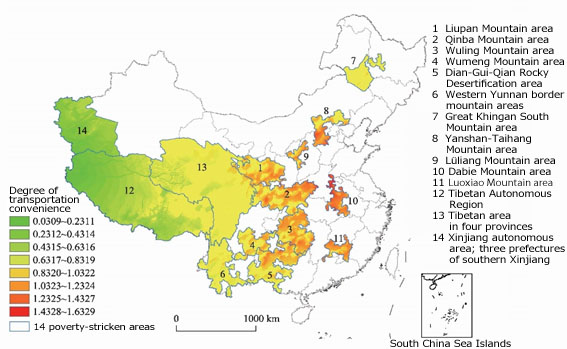
Figure 1
Our first study was to research the developmental conditions of children living in Qinghai Province, Yunnan Province, Sichuan Province, Hunan Province, Shanxi Province and other poverty areas. The results of our study show that the language, motor, and thinking skills as well as the cognitive skills of children living in poor areas are significantly lower than those of children living in urban areas. There is a kindergarten with 70 children in attendance in a rural area of Hunan Province. We visited the kindergarten to conduct our study and met children aged between two and seven years studying in the same classroom. None of them smiled at us, but all had a tense expression. It was obvious that they were going through experiences that were too arduous for their age. Nowadays, young children living in rural areas have to face various difficulties. One of them is a family problem. A recent social phenomenon is an increasing number of young parents from rural areas who leave home to seek work in urban areas, leaving their children with their grandparents. This trend leads to a lack of interaction between parent and child, which has become a serious issue affecting the development of children in rural areas. There are also other problems such as an inadequate number of kindergartens and a lack of educational resources such as books and toys (Figure 2).
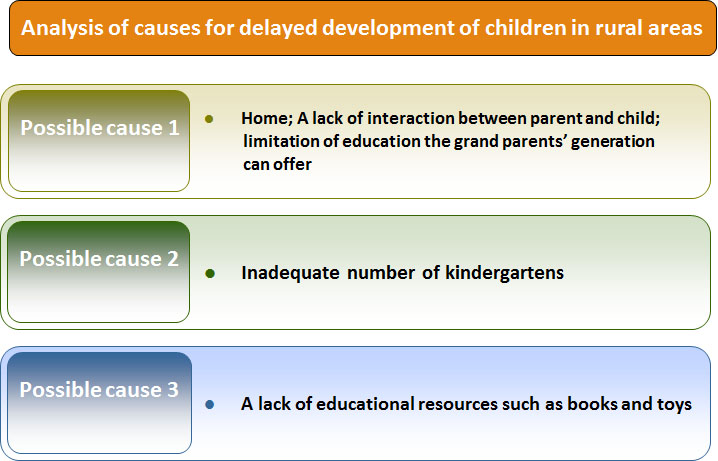
Figure 2
Our second study is to compare the development level of kindergarten children in rural areas with those of children in prefectural capitals. There are some key counties affected by poverty designated by the government in Shanxi Province, Guizhou Province and Qinghai Province. We conducted a comprehensive assessment on the psychological development of young children attending the Mountain Village Kindergartens (established under the Mountain Village Kindergarten Project) in these three provinces as well as in prefectural capitals, by using the methods of "psychometric analysis," "observation of play process" and "analysis of children's drawings." The results of this study revealed that children attending the Mountain Village Kindergartens in rural areas outperform their counterparts in prefectural capitals in some tests such as "socio-emotional development" and "certain motion development." Why did such results occur?
Let's look into the detailed results.
The following table shows the results of psychometric analysis on children attending the Mountain Village Kindergartens in rural areas, compared with their counterparts in prefectural capitals and those who do not attend kindergartens. The results indicate that these children attending the Mountain Village Kindergartens outperform their counterparts in prefectural capitals in some tests such as "Motion development," "Social skills" and "Emotional development," but lag behind in the areas of language and cognitive skills (Table 1).
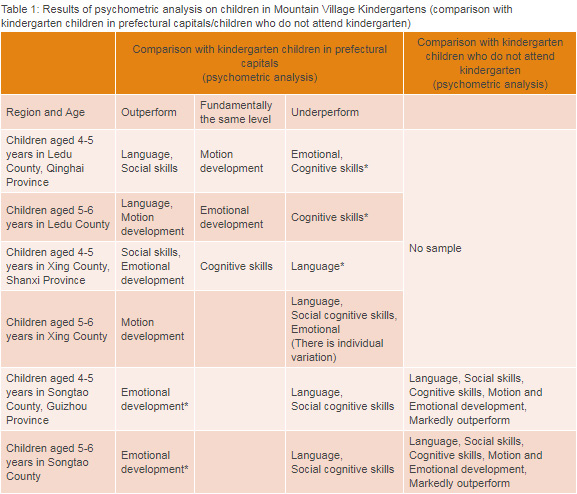
We also analyzed the results of "observation of play process" which revealed that children attending Mountain Village Kindergartens have a strong sense of rules, and actively join and maintain concentration through play (Table 2).
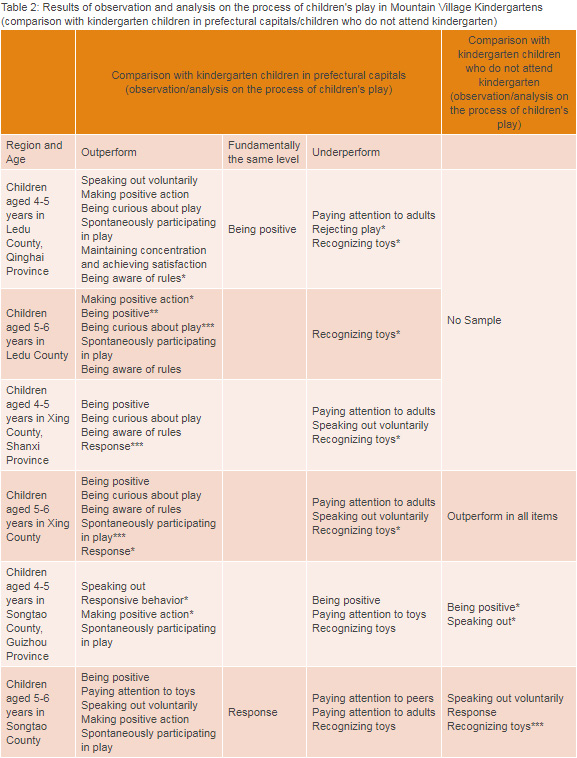
Finally, we analyzed the children's drawings. As a result, we found that a lot of children in Mountain Village Kindergartens show affection toward their family considering the use of color and the facial expressions of people in their drawings, while their understanding of drawing a picture, sensitivity, and ability to draw in detail are underdeveloped compared to their counterparts. (Figure 3, 4)
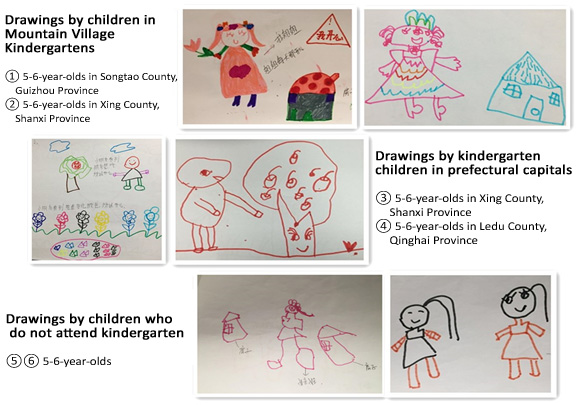
Figure 3
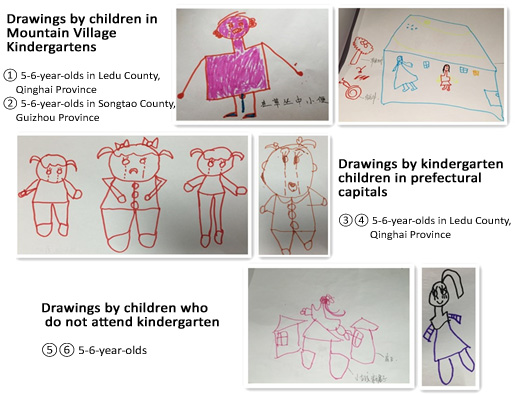
Figure 4
Needless to say, the level of economic prosperity is not the only factor that affects the psychological development of children living in poor rural areas. A dearth of educational philosophy and human relationships may also hinder their development.
Therefore, I would like to make the following suggestions. First, improve the entire environment of rural areas including families, kindergartens and communities. Second, provide support to encourage parents to develop a stronger consciousness to maintain interaction with their children and assist grandparents to acquire better child-rearing skills. Third, establish a family support system whereby people in rural areas can assist each other, such as setting up a child facility in local communities and planning mixed-age children's activities.
Thank you for your kind attention.
| | 1 | 2 | 3 | |















